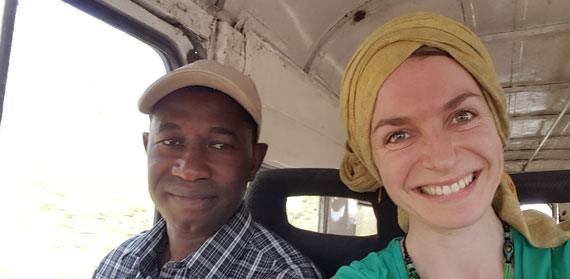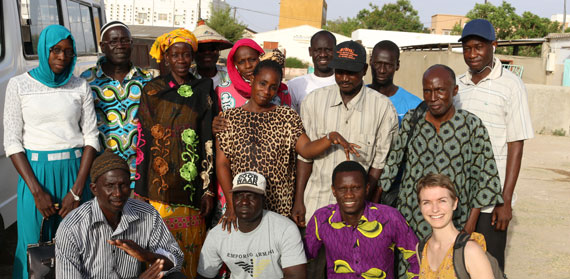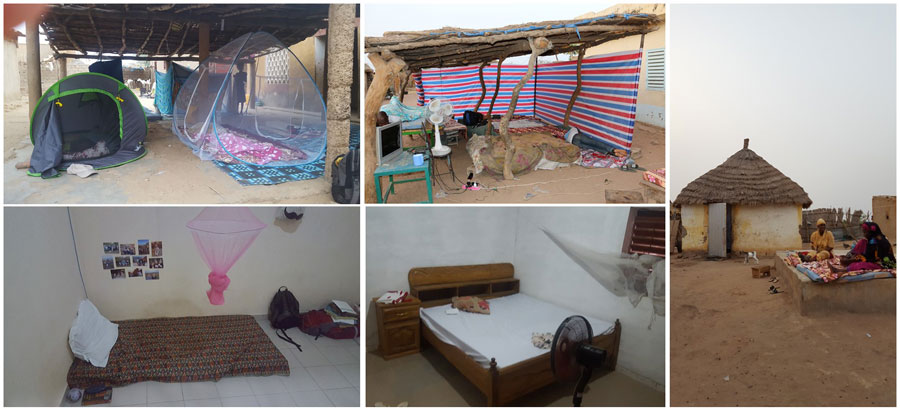Carla Sarrouy Kay with Youssou Sarr, her main contact in the field, one of the coordinators of the peasant organisation she works with © Carla Sarrouy Kay
Guest post by Carla Sarrouy Kay, Centre for Agroecology, Water & Resilience
People say that when you are doing a PhD, nothing else matters. Your PhD becomes the be-all and end-all of your life and during this (seemingly endless) period, nothing else in the whole universe matters. I believe this is one the reasons why mental health amongst PhD students is so poor…
The truth is, whilst you’re doing your PhD, life continues! Other people’s lives move on, and, – even if you bury your head in your literature – the truth is that your own life beyond the PhD is still very much there, real and evolving.
So, for me, the challenge is more a matter a balance. I want to give 1000% to my PhD, but I also want to manage the other aspects of my life that also matter a lot to me, like being a wife, a daughter, a sister, a friend, a citizen, a neighbour.
During PhD fieldwork this challenge becomes even greater. Fieldwork is so intense that juggling the different challenges it presents plus the different aspects of your life seems to be a very delicate task. I am now doing fieldwork in Senegal for most of the time between May 2017 and May 2018. Before fieldwork, I was seeing a psychotherapist who was helping me greatly with this whole balancing act, and now that I am doing fieldwork, I am reflecting on how to stay mentally and physically healthy during this long and intense period. Here are the few tips I’ve gathered and happily share. Feel free to comment this piece and tell me what you think about these tips and which tips you have too.
Tips to keep sane during your fieldwork!
1. Work with people you trust
I’m now spending most of my time with a new group of people and my whole fieldwork evolves around the coordinators and the members of the Senegalese Association of Peasant Seed Producers (ASPSP). I am far away from my family and friends, far from my usual points of reference and here this new group has become my main reference. I think that the only way to relate with people and work efficiently is through trust. If my PhD supervisor and I decided to work with this group, it was because we felt there was good communication and a positive trust relationship. After all, if anything happened to me here, they would be the first ones to know and the first ones to be able to help me. Once this decision is made and both parties feel they can relate trustfully and rely on each other, I feel that an essential base for my wellbeing and the success of my fieldwork is established. This also means one should feel they have the power and should have the leeway to leave if a relation or situation is unhealthy. Like every relationship in life, hopefully the period of fieldwork will be a chance for all parties to get to know each other better and to nurture positively this trust relationship.
A team you can trust! My work colleagues from ASPSP © Carla Sarrouy Kay
2. Stay in touch with family and friends
Staying in touch with our loved ones is essential and this can be done in different ways. I like to speak on the phone with my husband almost every day. We exchange news about home and about fieldwork and simply hearing his voice helps me feel more settled and serene. I love chatting with my mum, siblings, and wider family too, exchanging anecdotes and catching up on life. The positive effect of these conversations is obvious to me. Even when I feel that my loved ones may struggle to understand the situation I’m in, explaining my current situation and feelings is reassuring to them and a good exercise for me too.
3. Know yourself and Remember who you are
During my entire life I’ve moved a lot and I have learned to adapt to new situations and cultures. I find I struggle, not with adaptation, but almost with the opposite problem: I adapt so much to my new environment that I almost forget where I’ve come from and how my life used to be. Adapting “too much” is not necessarily a good thing, it might mean that I lose my reference points and end up feeling rootless. I find fieldwork is always a very intense period, where I build strong ties, and I’ve learned to know my limits and recognise when I’m going too far and my body and spirit are exhausted. Sometimes, all I need is a bit of peace and quiet, in a non-engaging environment. After all, there is no point in swimming against the tide: if you need a break, have a break! If I’m tired and feeling lost, I’ll very easily become ill and the whole fieldwork will have to be paused. So rather than sprinting, I look at fieldwork as a long marathon, with several drinking points to recharge my batteries!
Recharging batteries may be a matter of having a good chat on the phone with family or a good friend, or, for example, of listening to music that cheers me up and reminds me of good times back home (Maria Albertina by Humanos) or that is relaxing and exquisite (Une voce poco fa by Maria Callas)!
4. Create your own safe spaces
I was chatting with a colleague here about the fact that we travel a lot and spend at least 3 nights a week in a new and different environment. He gave me a great piece of advice: get a bed sheet that you take with you when travelling. No matter where you’re staying, in a comfy bed in a house or sleeping rough outdoors, you’ll have your own bed sheet and you’ll feel instantly that to some extent you are in a recognisable and comforting environment. I have already put this advice into practice and it works so well. Even when sleeping outdoors, with 12 more people all around, with noise, music, chatter, artificial light and/or a strong moonlight, having my very own bed sheet enabled me to create my own little space and sleep more peacefully. I actually do the same on a daily basis with a scarf I wear all the time. It protects me from the sun, covers my hair when needed (I’m in a Muslim country), protects me from the wind in car rides, warms me up (if it ever gets cold here!), covers my audio-visual equipment or allows me to hold coins, like local women do. This scarf was a present and it reminds me of home; it comforts me and has actually become a bit of a signature now! Finally, I’m very sensitive to smells and have brought a little set of essential oils to do my own aromatherapy. For example, I add clary sage to my pillow or scarf to calm down, vetiver (which I study in my work!) to feel grounded, or rose wood to give me peace and confidence.
Some of the places where I’ve slept recently! © Carla Sarrouy Kay
5. Keep up with your hobbies (or take up a new one)
This is not an easy one, especially if, like me, you are in a completely new setting. Hobbies are a great way to do something we love, forget for a moment about all other issues and concerns, and focus on an activity that is rewarding and fulfilling. They are also a great way to remind us that our PhD is not everything and that there are also other things that matter and deserve our attention!
I grew up near the Atlantic Ocean and love swimming and the sea breeze. Here is Senegal I am living a thirty-minute walk from the beach so, when I have some free time, I try to go to the beach and relax. Going to the beach has been essential for my mental health and wellbeing. When I’m travelling and am far from the ocean, I tend to be attending seed fairs, giving training, or visiting peasant organisations and these times are always very intense, both intellectually and emotionally. When travelling, because I tend to sleep in house courtyards, with all my colleagues and the family hosting us, even sleeping is not an experience of solitude! At times, I might feel I need some peace and quiet so I wake up early to go for walks when the houses are still sleepy. Going for a swim or for a walk are often the only times in the whole day when I am alone so, although I am an extravert, I do cherish these moments and try my best to make them happen.
6. Remind yourself (or review) the meaning of your fieldwork
Finally, my last point relates directly with work. I’ve left behind a lot of people and experiences to be here doing fieldwork for a year. I often think about this choice and need to reassure myself that (a) this was the right choice, and (b) that I am making the most of this time. PhD students are often very self-critical and I do fear sometimes that I may not be following the right path, that I may not be following the best approach for a successful fieldwork. What are my research questions after all? My hypotheses? Do I have a set methodology? What am I going to do with all this data? And the list of questions goes on… However, regarding mental health, I often find that this sixth point is related to all the other ones and that if I don’t trust my team, feel far from loved ones, feel rootless, lost and stressed, then I’ll start questioning everything about my PhD and end up feeling insecure.
The PhD is a long marathon on a route that is constantly under review. Knowing why I’m running and visualising my end goal are essential for me to enjoy the whole process. At times, I have felt disheartened but deep in my heart I am convinced I’m on the right track. Reminding me of the meaning of my fieldwork, or even reviewing it, have been opportunities to revigorated myself. The same happens when I have a break and go back home or do something completely different for a good few days: I notice I come back to work with renewed energy and curiosity!
Here are some pieces of advice. I’d love to hear from you too. Do share your tips and lessons from fieldwork. Hopefully by talking about mental health and wellbeing during fieldwork, we’ll help each other feel better and we’ll create a stronger PhD community.
If you’d like to read a bit more about my PhD or get in touch, do have a look at my website & blog!: www.cskagroecology.wordpress.com






Comments are disabled